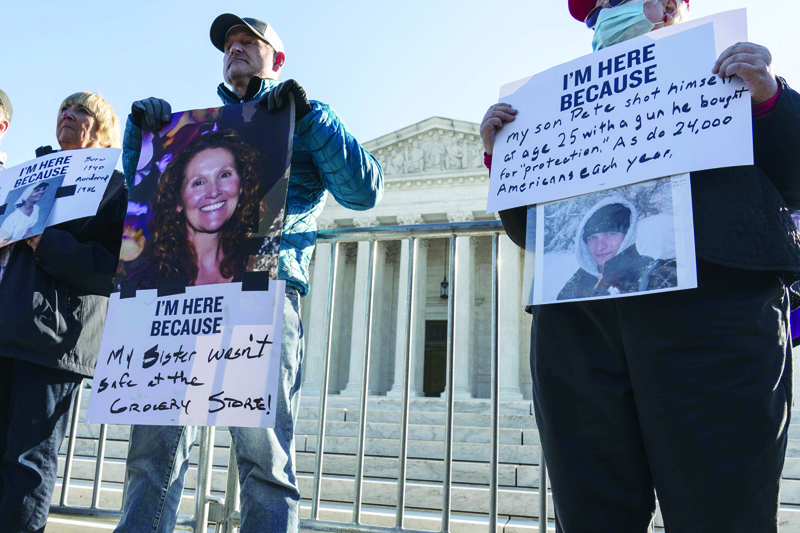 WASHINGTON: People hold signs and pictures of family members killed in shootings during a demonstration by victims of gun violence in front of the Supreme Court in Washington, DC. - AFP
WASHINGTON: People hold signs and pictures of family members killed in shootings during a demonstration by victims of gun violence in front of the Supreme Court in Washington, DC. - AFP
WASHINGTON: A majority of the conservative-leaning US Supreme Court appeared skeptical of a New York law restricting gun licenses at a hearing Wednesday that could lead to looser restrictions on carrying firearms in public. The hearing reflected significant divisions on the bench, which has a 6-3 conservative majority following the nomination of three justices by former president Donald Trump. But some of the conservatives seemed to be looking for a middle-ground solution to balance gun rights and public safety.
At issue is a challenge, backed by the gun lobby, to a New York law that regulates the carrying of firearms outside the home. It is the first major case involving the Second Amendment constitutional right to bear arms to be heard by the nation's highest court in more than a decade. The court had previously declined to take up several Second Amendment cases, but the three justices Trump named have been historically sympathetic to the arguments of gun owners.
This has raised fears among gun control advocates that local restrictions such as the New York law could be in jeopardy. At a small rally outside the court, Angela Ferrell-Zabata, of Everytown for Gun Safety, said the "potential consequences are pretty bad," and that a decision "could make it harder for states and cities to address this crisis" of gun violence. There were more than 43,000 gun-related deaths in the United States last year, including suicides, according to the Gun Violence Archive.
Patchwork regulations
In a landmark 2008 case, the Supreme Court ruled the Second Amendment ensured a right to gun ownership, but left it up to cities and states to set their own rules on carrying weapons outside the home. That led to a patchwork of regulations across the country. Lawyer Paul Clement, representing the petitioners, told the court that "carrying a firearm outside the home is a fundamental constitutional right."
He received strong support from conservative Justice Samuel Alito, who argued that "ordinary, law-abiding citizens" such as janitors, waiters and nurses should be allowed to arm themselves for safety. "There is the right to self-defense for celebrities and state judges and retired police officers," he said. But the three liberal justices on the bench highlighted the safety concerns of carrying weapons in public.
"They are dangerous guns," said Justice Stephen Breyer. "(If you have a license) to carry a concealed weapon and you go around shooting it, and somebody gets killed." Other conservative justices sought a middle ground, though they criticized the New York law. "Everybody agrees there have to be some regulations," said Amy Coney Barrett, one of Trump's appointees. The justices debated at length so-called sensitive places, where guns would still banned if the law were struck down, such as public transport, sports stadiums and tourist destinations like Times Square.
'Proper cause'
The more than century-old New York law currently requires someone applying for a permit to carry a gun outside the home to establish "proper cause." The suit heard by the Supreme Court was brought by two men who were denied permits to carry handguns for self-defense. Their appeals were rejected by lower courts, and the Supreme Court agreed to hear the case probing the Second Amendment, which has long been subject to differing interpretations. It reads: "A well regulated Militia, being necessary to the security of a free State, the right of the people to keep and bear Arms, shall not be infringed."
For the National Rifle Association and many gun owners, that guarantees the rights of citizens to carry weapons. "If the Supreme Court strikes down New York's 'proper cause' law, it could immediately call into question the constitutionality of similar laws in other states like California," said Joseph Blocher, a law professor at Duke University. A survivor of a mass shooting at a high school in Parkland, Florida in 2018, David Hogg, said on Wednesday at the rally outside the court: "We are asking for something simple: safety. We are asking for life." The Supreme Court has until June 2022 to issue a ruling in the case. - AFP




